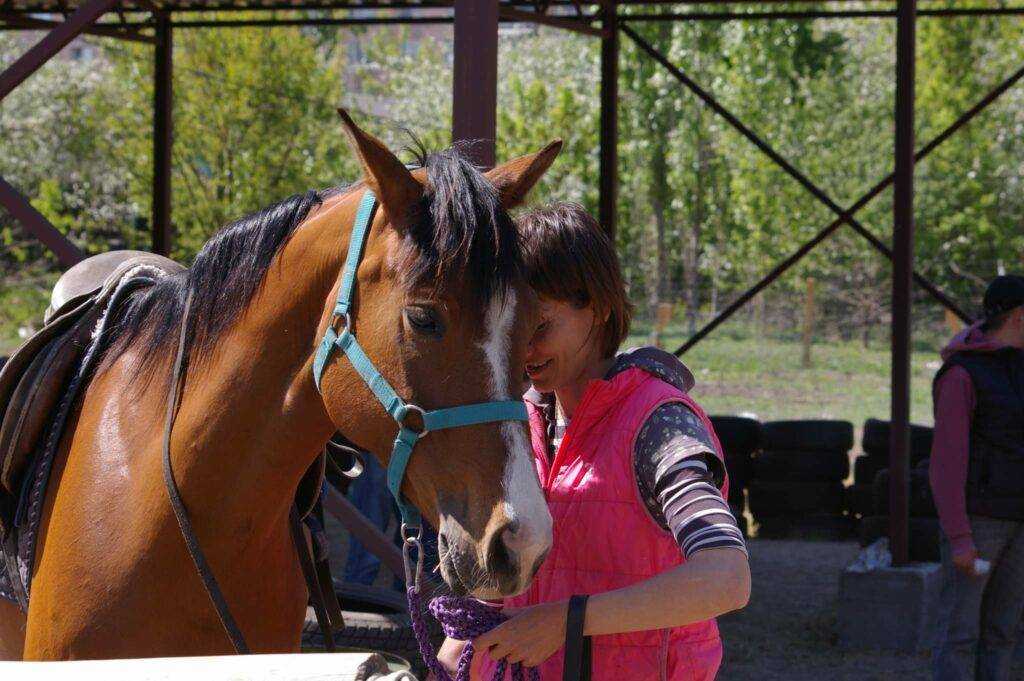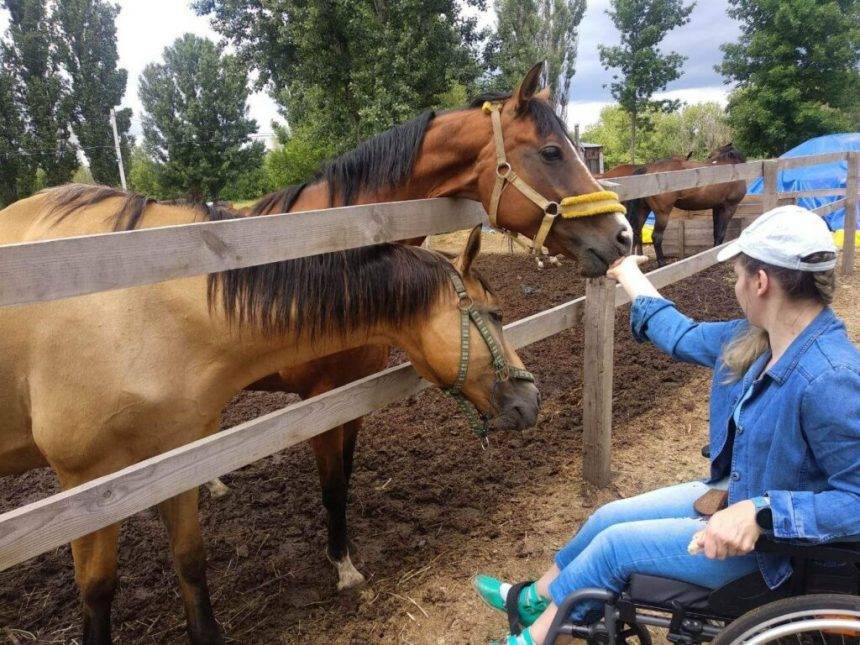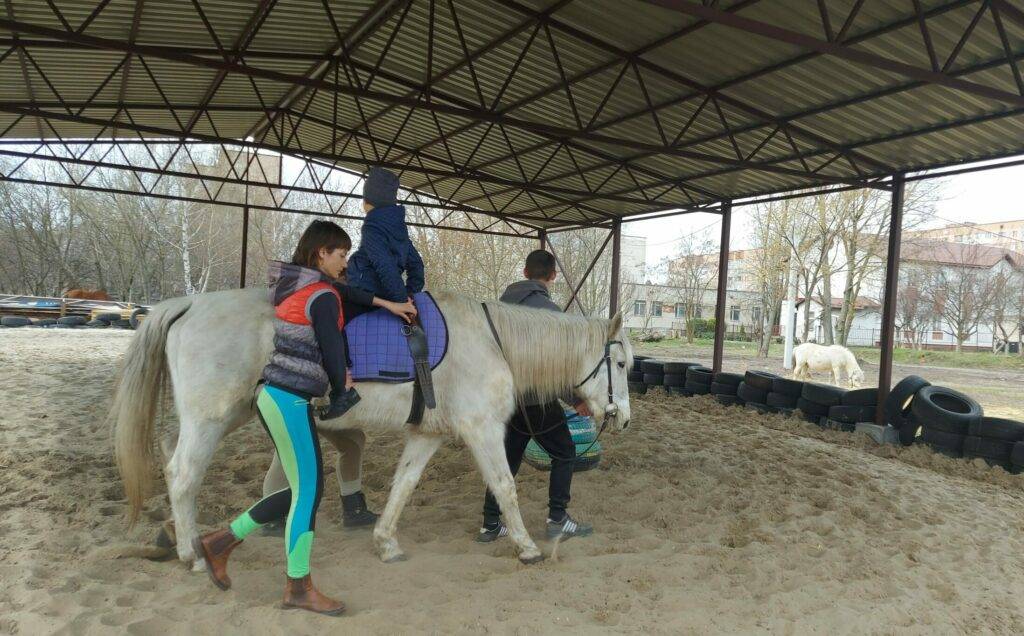
Horses for therapy: the social enterprise that has prospered despite the war
23/09/2022
Anna Derkach is an expert in social work in Ukraine. She is also the founder of the Hippotherapy and Development Centre in Cherkasy, which received support from an EU4Youth project that focuses on unlocking the potential of young social enterprises in Moldova and Ukraine.
Hippotherapy, one of the newest and most promising healthcare developments, is based on the use of the horse for the renewal of human bodily functions. Anna discovered it as part of her treatment for a physical disability caused by cerebral palsy – simply riding a horse helped her improve both her physical and mental health. Hippotherapy is especially useful in traumatic situations, such as those produced by war.
Anna explained the peculiarities of doing business during the conflict, the things that have helped her on her journey, and how to create a genuinely profitable social business.
How the project became a reality
Anna’s house was built specifically for families with disabled children. It has about 50 disabled people living there and is attached to a 2.6-hectare plot of land. One day, Anna was approached by a woman who had horses but didn’t have enough money to keep them. Anna realised that her land was perfect for a hippotherapy playground to improve children’s health. It was this eureka moment that got the ball rolling.

Fortunately, the European Union is pursuing a vast range of regional initiatives. One of them is the EU4Youth – EUnlocking project, which offers financial and technical assistance via its sub-grant component. Anna applied and received a sub-grant to support the growth of the social enterprise she had established. Her Hippotherapy and Development Centre focuses on providing innovative rehabilitation services for young people with disabilities and on other general health services for city residents.
Sub-grants: a breath of fresh air for social businesses
Anna’s project was struggling before it received the UAH 310,000 grant. The money supported the building of an arena, allowing the Centre to reach a new level and become a fully-fledged social enterprise. This enabled them to employ three young women (including one person with a disability). They have also seen a remarkable increase in marketing possibilities and in their customer base.
The demand for hippotherapy services financed by social funds is quite large. Up to 120 people in Cherkasy need 10-15 sessions twice a year. The improved functioning of the Centre made possible by the grant – especially the cover provided by the new roof – saw a threefold increase in the services that could be provided. The possibility of taking up and running recreational sessions at any time of the year has given a significant boost to the business.

Paid recreational services (horseback riding, riding lessons) are an essential supplement to the profitability of the enterprise. The revamped Centre also enjoyed a large increase in the volume of privately-funded business.
And all this is only in the city of Cherkasy. The wider region and the neighbouring areas do not have this type of service and so the possibilities for expansion are huge.
Anna explained just how beneficial hippotherapy is: “After the sessions, children and adults with serious illnesses can feel their bodies and muscles, improve their emotional state, open new feelings, and gain new impressions. I have experienced this for myself. Riding a horse with a physical disability due to cerebral palsy helped me strengthen my back, develop equilibrium, and train my muscles. After ten sessions, one child became more open and showed more emotion and desire. It is perfect for children with cerebral palsy and autism, as the activity therapy reduces muscle tone and improves the nervous system.”
A social enterprise in wartime
The obvious problems caused by the invasion have made things more complicated, but they haven’t stopped the work that Anna and her team are doing: “Fortunately, our rehabilitation centre is not located directly in the war zone, so we can work smoothly. But four of our horses had to be transported under fire from the war zone; luckily, no one was injured. However, there were doubts whether we would have enough food and other equipment to look after the animals. Still, volunteers again came to help and provided the Centre with everything we needed. During such difficult times, everyone helps each other, which is very encouraging.”

As many people have been forced to leave their homes, Anna and her colleagues converted the Centre into a shelter for the displaced. It can accommodate about 15-18 people. Volunteers are helping to install a kitchen, bathroom, and other amenities so more people can be accommodated. Anna is keen to help as much as she can: “We are very sensitive to this issue, especially for children who have travelled from their home town. For example, many came from Mariupol, a city devastated by the Russian troops. The children are exhausted, cannot sleep in the light, are afraid to get up while sitting in their parents’ arms, and do not want to eat. It is a real tragedy. However, after the rehabilitation sessions and their interaction with the animals, they have started laughing, being more open and generally showing joyful emotions.”
The only real obstacle to their work is the threat of a missile attack. When there is an air-raid alert they suspend operations and proceed to the basement of a hospital across the street that provides reliable cover.
The future
Despite the war, Anna is planning for tomorrow. She wants to build another arena, a greenhouse and a small café that provides activities for children. And as they already have plenty of horses, she wants to create a horse club that focuses on horseback training: “Our primary motivation is to help the community, so we will do everything possible for this, especially in such a difficult time when the war is going on. Once I required rehabilitation: now I am delighted that I can turn it into a valuable thing that helps others too.”
The EUnlocking project helps to foster the social entrepreneurial potential of young people in Moldova and Ukraine by establishing a favourable ecosystem for social enterprises, as well as by inspiring and supporting more young social entrepreneurs to develop and sustain their innovative solutions to the promotion of social inclusion and environmental sustainability across both countries. The project is co-funded by the European Union under its EU4Youth Programme.
Author: Denys Syryk
Stories
-
Katarina Mathernova: If Ukraine had a human face and a human spirit, it would be 10-year-old Roman Oleksiv
-
A regional mission to drive social entrepreneurship: the story of Ksenia Kosukha
-
EU restores safe water supply for 100,000 Ukrainians affected by war
-
Promoting IT during the war: Lviv IT cluster and how EU4Digital helps
-
Frontline digitalisation: Kharkiv IT Cluster collaborations
-
How EU4Youth is driving opportunity and success among young Ukrainians